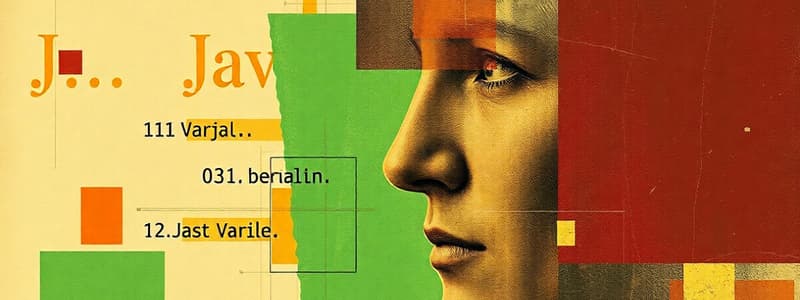Podcast
Questions and Answers
Which of the following is the primary function of a variable in Java?
Which of the following is the primary function of a variable in Java?
- To perform complex mathematical calculations.
- To control the flow of execution in a program.
- To define the structure of a class.
- To store and represent data values in memory. (correct)
How are Reference/Object data types created in Java?
How are Reference/Object data types created in Java?
- They are directly represented in the code without any computation.
- They are created using keywords such as `int` or `boolean`.
- They are implicitly created when a variable is declared.
- They are created using defined constructors of classes. (correct)
What is the default value of any reference variable in Java if it is not explicitly assigned a value?
What is the default value of any reference variable in Java if it is not explicitly assigned a value?
- null (correct)
- ""
- 1
- 0
Which of the following best describes a 'Java Literal'?
Which of the following best describes a 'Java Literal'?
What is a key characteristic of streams, relating to the original data structure?
What is a key characteristic of streams, relating to the original data structure?
Which programming construct supports decision-making based on a certain condition?
Which programming construct supports decision-making based on a certain condition?
What is the primary purpose of the if-then statement in Java?
What is the primary purpose of the if-then statement in Java?
Which of the following data types is NOT a primitive type in Java?
Which of the following data types is NOT a primitive type in Java?
What does the term 'pipelined' refer to in the context of Java Streams?
What does the term 'pipelined' refer to in the context of Java Streams?
Which of the following is true about the data a stream carries?
Which of the following is true about the data a stream carries?
Flashcards
What are variables in Java?
What are variables in Java?
Reserved memory locations used to store values when a variable is created.
What are Primitive Data Types in Java?
What are Primitive Data Types in Java?
The most basic data types available in Java, including byte, short, int, long, float, double, boolean, and char.
What are Reference/Object Data Types?
What are Reference/Object Data Types?
Data types created using defined constructors of classes, used to access objects. Examples include String, messagebox, and applet.
What are Java Literals?
What are Java Literals?
Signup and view all the flashcards
What is a Stream in Java?
What is a Stream in Java?
Signup and view all the flashcards
What are Conditional Statements?
What are Conditional Statements?
Signup and view all the flashcards
What is the If-Then Statement?
What is the If-Then Statement?
Signup and view all the flashcards
Study Notes
- Variables are reserved memory locations to store values and space in memory.
- Java has two data types: primitive and reference/object.
Primitive Data Types
- These are the most basic data types in Java.
- Java supports eight primitive data types: byte, short, int, long, float, double, boolean, char.
Reference/Object Data Types
- These are created using defined constructors of the classes and are used to access objects.
- They are declared to be of a specific type that cannot be changed.
- Class objects and various types of array variables are reference data types.
- The default value of any reference variable is null.
- A reference variable refers to any object of the declared type or any compatible type.
- Examples: String, messagebox, applet, inputbox, HiLo
Java Literals
- A literal is a source code representation of a fixed value.
- They are represented directly in the code without computation.
- Example: int num = 10, char = ‘A’
Streams
- A stream is a sequence of objects that can be pipelined to produce a desired result.
- Streams support many kinds of data, including simple bytes, primitive data types, localized characters, and objects.
- Some streams simply pass on data while others manipulate and transform the data in useful ways.
- Streams take input from Collections, Arrays, or I/O channels.
- Streams do not change the original data structure, and only provide results as per the pipelined methods.
Conditional
- Conditional statements support decisions based on a condition; if the condition is met or "true", a code piece is executed.
The If-Then and If-Then-Else Statements
- The most basic flow control statement in Java is if-then.
- If something is true, then do something.
- It is a good choice for simple decisions.
Studying That Suits You
Use AI to generate personalized quizzes and flashcards to suit your learning preferences.




